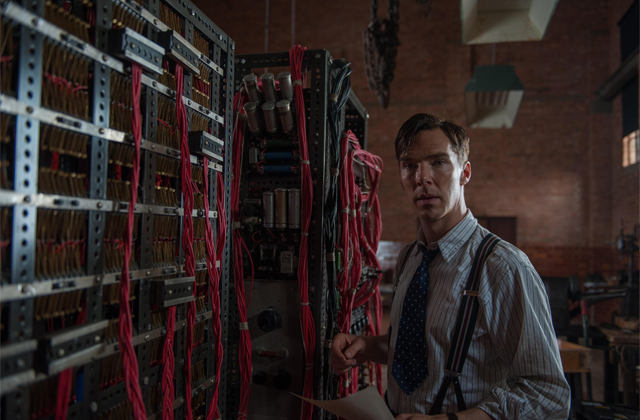The Imitation Game is a valiant failure of a prestige movie

‘The Imitation Game’ is yet another movie that tries to use great acting to make a mediocre movie good. It almost works.
Historical biopics are tricky, as I’ve mentioned several times before. I don’t much care for ones that screw it up, and I care even less for ones wholly meant for getting some awards. And perhaps, just perhaps, I’m a bit sick of Benedict Cumberbatch everywhere. The man is a good actor, but I did not like his performance in Star Trek Into Darkness or August Osage County, plus he was unrecognizable CGI in The Hobbit movies. Now he’ll be starring in a new Marvel movie as comic book magician Dr. Strange? He’s getting on my nerves a bit. But on the other hand, that doesn’t mean I should necessarily judge the movie he’s in based on his Jude Law penchant for being in movies. No, no, it’s just better to judge the movie instead.
The Imitation Game tells some of the story of famed World War II technological innovator Alan Turing’s life, based on the book Alan Turing: The Enigma by Andrew Hodges. Alan Turing, played by the omnipresent Benedict Cumberbatch, is essentially responsible for pioneering advances that led to the first digital computer. The movie utilizes a limp wristed and ill-advised wraparound device, starting in 1952 with Turing’s home mysteriously robbed but seemingly with nothing of value lost. By virtue of a sort of flashback induced by a police inspector interrogating Turing, the rest of the movie is shown. Now, if you ask me, this device did not work. It made no sense, and served no real purpose, because it tried to create a mystery of “why did he get robbed,” but the question is not answered. Instead, we get barely anything on what really happened; but I’ll get back to that in a minute.
During World War II, England is in bad shape. We see several scenes of bombings and crowds huddled in shelters, which does add an interesting level of pathos to the movie. Does it make sense with that narrative device I mentioned? No! Not in the slightest. But I’m harping on that. So the movie jumps back and forth between little scenes of the future investigator trying to discover the truth, a few bits of Alan’s past in boarding school, and the actual content and story of the movie. Alan Turing joins an elite group of men working to break Nazi codes, specifically the Enigma code machine. The military commander Denniston (a superb Charles Dance) does not care for Turing’s awkwardness or odd way of doing things, but his hands get tied when Turing goes over his head. So Alan works, or tries to work, with his group of fellow codebreakers. But he doesn’t get along well with people.
Eventually, he is permitted to hire someone new who might be smart enough to assist, and he hires Joan Clarke (Keira Knightley), although in real life several women worked on the Enigma breaking project. In any event, Turing and Joan have a connection of sorts, their intellects, although Turing stumbles and stutters his way through most human interactions. It all leads up to whether or not they actually break the Enigma and help win WWII. SPOILERS! They do. There are others on his team, but they aren’t that interesting. But unfortunately, despite Alan helping to save the world, he is arrested in 1951 on charges of “indecency,” which means he admitted to having a homosexual relationship. The movie barely touches on this terrible tragedy, and basically only hints on how Turing committed suicide after having been chemically castrated. In fact, only in 2013 did the British government finally grant an official pardon. That’s ridiculous.
Now, it is true that there are some excellent performances in this movie. Charles Dance, as I mentioned is great and amusing as the intimidating military officer. And sure, Keira Knightley is lovely here too, even if her part is underwritten, like everything is in the movie. The various other whos and whats in the movie are forgettable and not really important for anything the movie cares about. Cumberbatch does a pretty good job as a man with a high intellect but other problems, although he plays it like a man on the autistic spectrum, which is … debatable about the real Turing. The movie is mostly paced pretty well, but there are very slow parts. There are some really great scenes, building up the tension and despair as they fail and fail again to crack the codes. Although the actual way they figure it out seems … well I won’t give that part away.
In this time of the year, with all the fancy schmancy prestige flicks coming out, The Imitation Game is nothing close to the best of the bunch. Alan Turing may be an important historical figure who deserves to be remembered, but I don’t think this is the movie that will accomplish that.
 CliqueClack
CliqueClack
